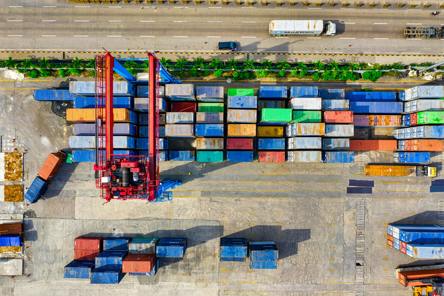4PL providers play an important part in supply chain operations. Responsible for overseeing the entire supply chain, they help businesses optimise their logistics processes, cut costs, and remain competitive in a busy market.
In this guide, we outline everything you need to know about 4PLs, including what a 4PL is, what services they provide, how they compare to other levels of logistics management, and what the advantages of working with a 4PL are.
What is a 4PL?
A fourth-party logistics provider, also referred to as a 4PL, oversees the entire supply chain on behalf of their clients and provides them with end-to-end supply chain solutions.
As their client’s entire supply chain and logistics operations are outsourced to the 4PL, they typically act as the single point of contact for everything related to supply chain management.
Ultimately, 4PLs aim to make the supply chain and logistics operations of their clients cheaper, seamless, and more efficient. 4PL logistics focuses on streamlining a business’s logistics functions as a whole, rather than individual parts.
Key characteristics of 4PL logistics
4PL logistics providers manage and coordinate entire supply chains and logistics operations on behalf of their clients, including warehousing, inventory management, freight forwarding, supplier management, customs management, product distribution, and returns management.
There are many key characteristics of a 4PL:
-
Acts as a consultant and single point of contact for the client
-
Coordinates and manages all key relationships and operations within the supply chain
-
Optimises logistics operations using technology-based solutions
-
Provides real-time analytics and data-led insights to clients
Common 4PL services
As 4PL logistics providers are responsible for operations across the supply chain, they offer a wide scope of services. Common examples are outlined below:
Supply chain strategy and planning
4PLs aim to assess their clients’ current logistics operations and improve them, coming up with a tailored supply chain strategy to optimise processes, reduce costs, and meet business needs.
Transportation management
4PL providers are responsible for choosing the most cost-effective, reliable carriers for their clients and negotiating contracts with them. Often, they will also choose transportation options that are easily trackable for better visibility.
Coordinating the movement of goods on a global scale is one of the main services a 4PL will offer.
Inventory and warehouse management
Inventory and warehouse management is an important responsibility for 4PLs. They are in charge of developing and implementing new strategies for maintaining optimal inventory levels and reducing costs.
Another aspect of inventory and warehouse management is overseeing all warehouse operations, improving handling practices, and maximising space.
Vendor and partner management
4PLs manage relationships with suppliers and carriers on behalf of their clients. They coordinate everything to ensure that all vendors and partners are working to a high standard and to the service level agreed upon between them.
Compliance and risk management
Risk management and mitigation in supply chains is important as they are prone to a variety of risks, unexpected disruptions and delays.
4PLs assess potential risks by monitoring internal operations and external market conditions. This allows them to develop strategies that aim to avoid them or minimise their impact.
Compliance with local, national, and international regulations is also vital, and 4PL providers leverage their expertise to ensure their clients remain compliant.
Technology implementation
4PLs help their clients build a technological infrastructure that enables a seamless exchange of data and optimises current logistics processes. If their client already has software, the 4PL will work with them to consolidate the various software into a single system.
They might implement transportation management systems (TMS), warehouse management systems (WMS), and business intelligence platforms for their client.
Analytics and data-led insights
4PLs leverage a range of data technology systems to collect insights into their clients’ supply chain performances. This helps them make informed decisions about logistics operations and areas for improvement.
Data analytics and insights help 4PLs identify bottlenecks in the supply chain, inefficiencies, and negative trends. They can look for unobvious patterns and understand the reasons behind this.
An introduction to logistics levels
There are different levels of logistics management. These levels depend on the number of parties involved. The higher the stage, the more complex the level of service offered.
The different levels of logistics management are as follows:
-
First-party logistics (1PL): The business manages the transportation of goods itself.
-
Second-party logistics (2PL): The business outsources specific supply chain functions to external service providers.
-
Third-party logistics (3PL): The business outsources warehousing to an external provider.
-
Fourth-party logistics (4PL): The business outsources logistics processes to a provider who manages the entire supply chain.
What is the difference between 3PL logistics and 4PL logistics?
While 3PLs and 4PLs may seem similar, there are key differences between the scope of services, management levels, and integration they offer.
|
3PLs |
4PLs |
|
|
Focus |
Operational focus, overseeing specific workflows |
Strategic focus, overseeing and coordinating the entire supply chain |
|
Assets |
Typically own or lease physical assets needed for their services |
Some utilise the assets of 3PLs and other service providers, whereas others, like SEKO, own their own 4PL assets |
|
Client relationships |
Single geography relationship, working with their clients to execute specific logistics operations outsourced to them |
Strategic relationship, working with their clients long-term to improve the entire supply chain |
|
Role in the supply chain |
Responsible for managing specific logistics operations |
Responsible for overseeing the entire supply chain |
|
Suitable for |
Small to mid-sized companies |
Large companies with complex supply chains |
Learn more about the difference between 3PLs and 4PLs.
Advantages of using a 4PL
There are many advantages of using a 4PL for your logistics operations. Learn more about the biggest advantages below, or read our blog on the benefits of 4PL logistics.
Advanced technology
4PLs use cutting-edge technologies that enable them to use advanced data analytics, artificial intelligence, and automated processes. This provides greater visibility of the supply chain and helps them identify bottlenecks, areas for improvement, and make decisions informed by in-depth data.
Strategic Oversight
Working with a 4PL offers a holistic approach to your logistics operations. 4PLs oversee the entire supply chain, providing your business with a view of the bigger picture and enabling you to make data-driven, informed business decisions.
Ultimately, working with a 4PL can offer great strategic oversight for your business, which can help optimise your logistics processes and give you a competitive edge.
Expanded reach
Many 4PLs have an expansive reach, which means businesses can strategically distribute inventory to different geographic locations across the world and scale their business, bringing in more customers and revenue.
This also helps businesses cut costs and delivery times, helping them compete with other companies in their market.
Extended network of partners
4PL logistics providers have a large network of partners, suppliers, and carriers that they have established relationships with. This makes it easier for them to negotiate good rates and service terms with them, reducing costs and improving efficiency.
As 4PLs manage all of these relationships, their clients spend less time fostering these relationships themselves and can focus on other areas of the business.
Flexibility and scalability
4PL logistics processes can be scaled up or down depending on the needs of your business. Many 4PLs will also provide tailored logistics solutions that are designed to meet the individual requirements of your business.
The future of 4PL logistics
As optimised and efficient supply chains become more and more important to ensure businesses remain competitive, 4PL logistics is expected to grow.
Some key trends that could impact the future of 4PLs include:
-
Emerging technologies: Technologies like Internet of Things (IoT) and machine learning will provide more data-led insights, visibility, and efficiency.
-
AI and automation: AI and automation will make the processing of large quantities of data easier, improving insights into the supply chain and predictive analytics. It will also help streamline repetitive tasks and make them more efficient.
-
Sustainability: As sustainability becomes an increasing concern, 4PLs will likely adapt to implement more eco-friendly and environmentally-conscious logistics solutions.
-
Improved collaboration: Collaboration between 4PLs and their suppliers may be improved, and there might be an increase in collaborative platforms, sharing data, and exchanging information.
-
Focus on customer experience: Making sure customers are satisfied is important to keep businesses competitive. 4PLs may continue to evolve to provide customer-centric logistics solutions.
SEKO Logistics: Your Trusted 4PL Logistics Provider
Think 4PL logistics is right for your business? SEKO are a trusted 4PL provider dedicated to providing businesses with integrated, end-to-end logistics solutions that provide greater visibility and enable growth.
With an extensive global network, we provide expert ecommerce logistics solutions across the world, including:
Contact our team of logistics experts today to discuss how we can help streamline your operations and give your business the competitive edge it deserves.



